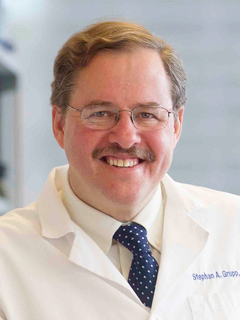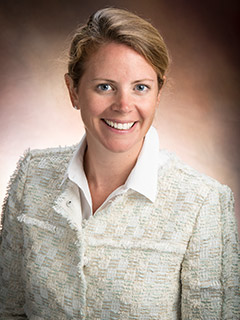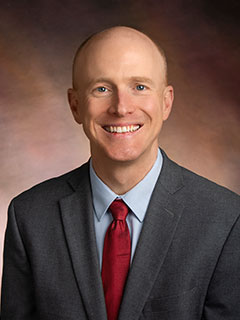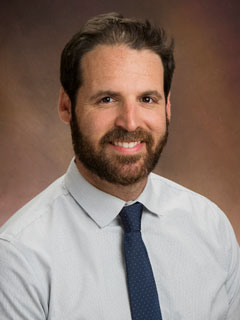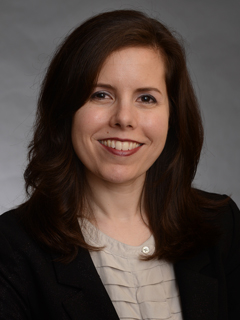HOW CAN WE HELP YOU? Call 1-800-TRY-CHOP
In This Section
STAT Madness, Synovial Sarcoma Conference, Sickle Cell Disease, Pediatric-onset MS

It's March, which means it's time to gear up for some madness — STAT Madness, that is. Cast your vote for Children's Hospital of Philadelphia-led hemophilia A gene therapy research. Also highlighted in this week's news is the first Synovial Sarcoma Conference co-hosted by CHOP, and two scientists named as "Disrupters of the Year" for their contributions to sickle cell disease research. This and more In The News.
CHOP Researchers Named 'Disruptors of the Year' for Sickle Cell Disease
Among 10 "Citizens of the Year" award recipients are two of our own renowned researchers: Stephan Grupp, MD, PhD, Section Chief of Cellular Therapy and Transplant at CHOP, and Alexis Thompson, MD, MPH, Chief of the Division of Hematology.
The Philadelphia Citizen named them "Disruptors of the Year" for their trailblazing contributions to sickle cell disease (SCD) research and care.
Dr. Grupp, who is also the Director of the Susan S. and Stephen P. Kelly Center for Cancer Immunotherapy, has extensive experience developing and administering CAR T-cell therapy. Combined with Dr. Thompson's extraordinary knowledge and leadership in the field of hematology and SCD, they spearheaded research efforts at CHOP that led to the U.S. Food and Drug Administration approvals for exa-cel (Casgevy®, Vertex) and lovo-cel (Lyfgenia™, bluebirdbio), the first gene therapy treatments for patients with SCD 12 years and older.
"If we're able and willing to step out just a little bit and to see that we are global citizens, that we have the possibilities of having an impact in our lifetime around the world, perhaps in the lives of [those] we'll never meet — to be daring enough and bold enough to actually think that we can do that is a real privilege," Dr. Thompson told The Philadelphia Citizen.
Expressing similar sentiments Dr. Grupp said, "If we can make it work right — and that includes getting the economics and the finances right — you can imagine the most amazing things, you can imagine them coming to fruition within your own career, and you can have the sense that what you did really make a lot of difference."
Drs. Grupp and Thompson were honored during a celebration at the Fitler Club Ballroom at the end of February alongside the other Citizens of the Year.
Learn more in this Philadelphia Citizen post.
Vote for Hemophilia A Gene Therapy Research in 2025 STAT Madness
Help spotlight CHOP research in the 2025 STAT Madness annual biomedical research bracket competition! This year, the STAT team selected a Nature study by Lindsey George, MD, Director of the Clinical In Vivo Gene Therapy group at CHOP.
Dr. George and her research team revealed key findings that could advance next-generation gene therapies for hemophilia A, a rare hereditary bleeding disorder caused by a deficiency in clotting protein factor VIII (FVIII).
Researchers worked with animal models to analyze whether an enhanced function FVIII variant (FVIII-R336Q/R562Q) could help normalize hemostasis without the previously observed decline in expression year to year after gene therapy treatment. Their preclinical data support that the variant could restore normal FVIII function at low levels of expression to permit durability using low vector doses to minimize dose-dependent adeno-associated virus toxicities.
STAT Madness celebrates cutting-edge biomedical research from top institutions across the country. The first round of voting is open through March 9.
CHOP and Penn Medicine Host Inaugural Synovial Sarcoma Conference
CHOP and Penn Medicine co-hosted the inaugural Synovial Sarcoma Conference March 1, where leading experts in oncology, hematology, radiation oncology, and surgical innovations, presented the latest advancements in synovial sarcoma treatment and research. Synovial sarcoma is a rare and aggressive soft-tissue cancer that affects fewer than two in a million people in the U.S. per year, with approximately half of cases occurring in adolescents and young adults.
Insights from leading medical experts and powerful perspectives from patient advocates provided attendees an opportunity to engage with the community, gain valuable knowledge, and contribute to meaningful discussions.
"This conference is an invaluable opportunity to bring together the best minds in the field and accelerate progress for patients of all ages," said conference lead speaker Theodore Laetsch, MD, Pediatric Oncologist and Director of the Very Rare Malignant Tumors Program at CHOP.
Additional presenters from CHOP included Jacquelyn Crane, MD, Attending Physician in the Division of Oncology; Rachel Hurley, MD, PhD, Pediatric Hematology and Oncology Fellow; and Christine Hill-Kayser, MD, Pediatric Oncologist in the Cancer Center.
Read more in this Synovial Sarcoma Foundation press release.
Ongoing Clinical Trial Supports Exa-Cel as Potential Durable Treatment for SCD
An abstract published in Transplantation and Cellular Therapy, as part of the special issue featuring abstracts from the 2025 Tandem Meetings of the American Society for Transplantation and Cellular Therapy (ASTCT) and the Center for International Blood and Marrow Transplant Research a Research Collaboration Between the Medical College of Wisconsin (CIBMTR), reports on the durable clinical benefits of using exagamglogene autotemcel (exa-cel) (Casgevy®, Vertex) as a potential one-time functional cure for patients with severe sickle cell disease (SCD).
Stephan Grupp, MD, PhD, Chief of the Cellular Therapy and Transplant Section at CHOP, and the research team shared their results from on ongoing Phase 3 clinical trials that uses exa-cel to treat patients ages 12 to 35 years old with SCD. Exa-cel is a cell therapy that reactivates hemoglobin F via non-viral, ex vivo CRISPR/Cas9 gene-editing at the erythroid enhancer region.
After infusion, all 46 patients maintained increased levels of hemoglobin and hemoglobin F. Ninety percent of patients also experienced elimination of vaso-occlusive crises, which occur when sickle-shaped red blood cells block small blood vessels, preventing blood flow to tissues and causing severe pain.
Dr. Grupp and colleagues presented this abstract during the Tandem Meetings Transplantation & Cellular Therapy Meetings of ASTCT and CIBMTR in February in Honolulu, Hawai'i.
Analysis of Trial Results Informs Interventions for Patients with Cardiac Disease
Researchers from CHOP analyzed results from the Quality of Life in Children With Inherited Cardiomyopathy or Arrhythmia (QUALIMYORHYTHM) trial, and their commentary, published in JAMA Network Open, asks investigators to reconsider a traditionally restrictive approach to exercise for children with cardiomyopathies and inherited arrhythmias.
"As a field, we are coming to appreciate that the risk of participating in physical activities for children with cardiomyopathy is likely not as high as we once thought, and that restricting them from participating comes with costs to their physical and mental health," said commentary co-author Jonathan Edelson, MD, a Pediatric Cardiologist at CHOP. "As we begin to shift our orientation towards physical activity, from one of restriction to one of promotion, we also need to focus our efforts to define more accurately disease specific risk, and to develop interventions that promote physical activity in a way that is effective, sustainable, and equitable."
QUALIMYORYTHM was a prospective, multicenter, cross-sectional study performed in France that evaluated cardiopulmonary fitness and daily activity levels in those with inherited arrhythmias and cardiomyopathies, and compared those findings with those of peers without cardiac disease. It also identified links between exercise and physical and mental health. Researchers found that personal motivation and sociodemographic components, including patient and family educational levels, also impact the physical activity levels of patients with cardiac disease, and should be considered when designing interventions.
Their findings were published in JAMA Network Open.
Early-life Sun Exposure Associated with Lower Risk of Relapse in Pediatric-onset MS
A multicenter cohort study of children with multiple sclerosis (MS) showed greater early childhood and prenatal sun exposure time was associated with lower risk of relapse.
Low sun and ultraviolet radiation (UVR) exposures have been associated with increased risk of developing pediatric-onset MS. This study investigated whether there was an association between as well as the effect of more recent occurrences of sun exposure in the study participants' lives on risk of relapse.
Participants with pediatric-onset MS were recruited from 18 pediatric MS clinics across the United States between Nov. 1, 2011, and July 1, 2017. Gina Chang, MD, MPH, a Child Neurology Resident with the Division of Neurology, and Amy Waldman, MD, MSCE, Medical Director of the Leukodystrophy Center at CHOP, led the study at CHOP.
In the study cohort of 334 children with MS, 206 (62%) experienced at least one relapse from disease onset to the end of the follow-up period. The researchers measured time spent in the sun at various periods of life using a detailed environmental questionnaire, and ambient UVR exposure was determined using zip codes. Models used to assess the association between time spent in the sun and UVR dose at specific periods of life and the risk of relapse were adjusted for demographic, clinical, and sun exposure-related characteristics.
The findings showed that 30 minutes or more of daily sun exposure during the first summer of life was associated with a lower risk of relapse compared with under 30 minutes of exposure. Greater time spent in the sun during the second trimester of pregnancy was also associated with reduced risk of relapse. UVR dose and time spent in the sun later in life were not significantly associated with relapse risk.
"Additional studies of sun exposure at other periods of life are needed to better characterize its impact on disease course and inform potential future interventions," noted the authors.
The findings were published in Neurology, Neuroimmunology & Neuroinflammation.
ICYMI
Catch up on our headlines from our Feb. 21 In The News:
- ASCI Recognizes Early-Career CHOP Researchers
- Society of Pediatric Research Honors Exceptional Scientists
- Treating ADHD in Autistic Adults May Improve Overall Health Outcomes
- CHOP Researchers Identify Molecular Cause for Milk Allergen Trigger in EoE
- Pediatricians' Role in Preparing Black Youth for Potential Police Encounters
Keep up with our news, stories, and updates in real time by following us on X, Facebook, LinkedIn, or Instagram. Meet the minds behind the science in the Bench to Bedside podcast. Or subscribe to our newsletter to receive an email every other Friday.

